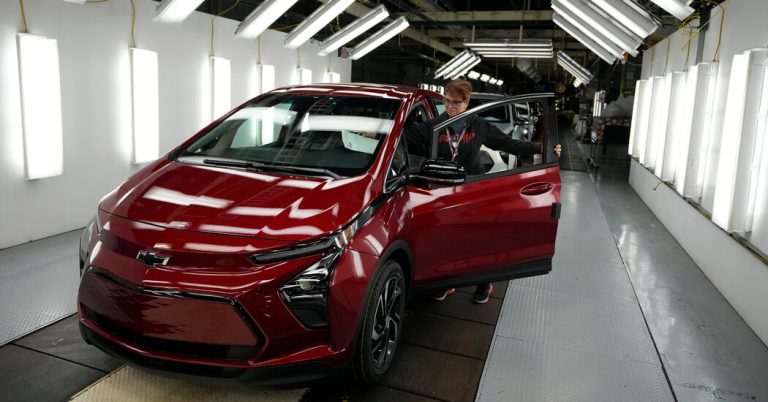General Motors said on Tuesday that its profit in the final three months of 2023 was reduced by the cost of a 40-day strike at some of its US plants and an accounting charge related to electric vehicles.
The automaker, which has seen rapid growth in sales of battery-powered models, earned $2.1 billion in the fourth quarter, it said, up from $2.0 billion a year earlier. GM’s revenue jumped about 10% to $171.8 billion.
“The pace of EV growth has slowed, which has created some uncertainty,” the company’s chief financial officer, Paul Jacobson, said on a conference call.
The strike, by the United Automobile Workers union, cost the company $1.1 billion. GM also spent $800 million in a settlement with LG Energy Solution, a battery supplier, related to a massive recall of the electric Chevrolet Bolt.
And the company took a $1.7 billion charge mostly to account for battery cells that were produced at such a high cost that they caused GM to lose money on electric vehicles equipped with them. Mr. Jacobson said cell costs are coming down and GM’s electric cars and trucks will become profitable in the second half of this year.
Several automakers, including Tesla and Ford Motor, have cut prices in response to weaker-than-expected demand for battery-powered cars. GM has also struggled to produce such vehicles in large numbers because of manufacturing problems with a new battery technology the company calls Ultium.
For the full year, GM said, it made $10.1 billion, up nearly 2 percent from 2022. Based on the company’s earnings in 2023, about 45,000 UAW workers will receive profit-sharing bonuses of up to $12,250. the company said.
The automaker said it expected earnings of $9.8 billion to $11.2 billion in 2024. That range suggests GM could enjoy a big jump in profits or suffer a small decline, highlighting growing uncertainty about demand for cars and the overall health of the automotive industry. The company expects to spend about $1 billion less than last year on its self-driving Cruise division, which has suspended testing and commercial service of its fleet nationwide in response to growing safety concerns.
GM has also leveled off its electric car ambitions. GM once expected to produce 400,000 electric vehicles by mid-2024, but consumers haven’t flocked to battery-powered cars as quickly as auto executives expected.
The company dropped that production target last year and has delayed the introduction of some new electric models it is developing. Last month, it told dealers to stop selling the electric version of the Chevy Blazer until GM engineers could fix a software problem that could cause some of the sport utility vehicle’s features to shut down.
In the fourth quarter, GM sold more than 19,000 electric vehicles, but most were Bolts, which are no longer in production and use older battery technology. Only about a third of the electric vehicles sold used the newer Ultium batteries produced at a plant in Ohio that GM owns in a joint venture with LG.
Mr. Jacobson said GM had “a lot of demand” for its electric vehicles but was cautious about building more vehicles than customers were ready to buy. “We feel good about where we are,” he said.
GM Chief Executive Mary T. Barra said the company expects to produce 200,000 to 300,000 electric vehicles with Ultium batteries in North America this year. It sold nearly 76,000 battery-powered cars and trucks in the United States in 2023.
Ms. Bara also said the automaker plans to sell plug-in hybrid vehicles in the coming years, something its dealers are asking for amid sluggish sales of all-electric vehicles.
A plug-in hybrid combines a gasoline engine with an electric motor and a battery that can be charged with a plug. Such vehicles can travel a short distance on battery power alone. GM stopped making the Chevrolet Volt plug-in hybrid, which could travel up to 53 miles on electric power alone, in 2019.
“The deployment of plug-in technology in strategic segments will deliver some of the environmental benefits of EVs as the nation continues to build out its charging infrastructure,” Ms. Barra said.
GM has set a goal to end production of internal combustion vehicles by 2035 as part of an effort to reduce emissions and combat climate change.




